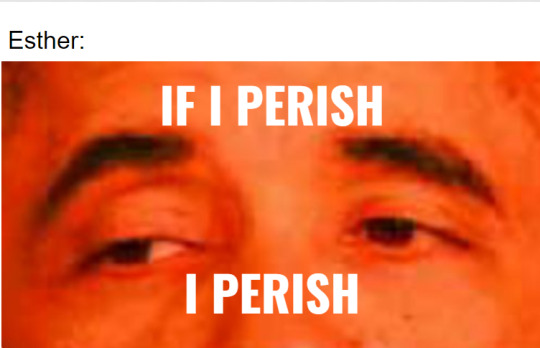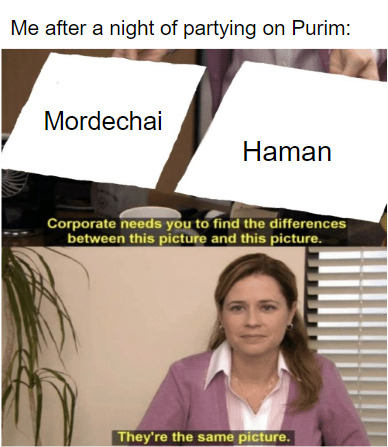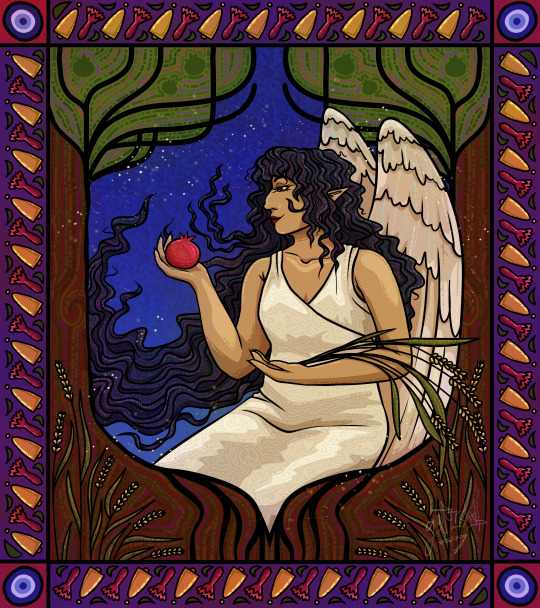#tanakh
Text
Various Purim memes for ya'll:










[id in alt text]
2K notes
·
View notes
Text
PSA: The Torah is NOT the equivalent of the Old Testament. That is the Tanakh. The Torah only covers the first five books (Genesis, Exodus, Leviticus, Numbers, Deuteronomy).
I've seen too many people be highly confident in this idea and it's driving me a bit mad. Oh and also the Jewish understanding of these texts is worlds away from the Christian understanding, so just keep that in mind. Anyway, that's all.
Ignore the tags, B"H.
#judaism#torah#tanakh#psa#old testament#christianity#bible#jewish#jumblr#religion#carverop#yeshivawithcarver#references
931 notes
·
View notes
Text
I relate to Jonah very personally because I too would like to be thrown overboard whenever I mildly inconvenience someone
183 notes
·
View notes
Photo

The Song of Songs, translated by Ariel and Chana Bloch
428 notes
·
View notes
Text
This may be a weird complaint and I’m probably driving way out of my lane here but…
I was looking up Hebrew-English Torah (Torahs? Don’t know how to pluralize that) and Talmud because I follow several Jewish creators here on tumblr and on YouTube. So much of what these creators say about Judaism is so beautiful that I wanted to know more, and, being a bibliophile, my first instinct was to look for the writings.
And I found them? But I can’t tell a good English translation from a bad one, so I checked the reviews. And this is where the weirdness comes in and where I may be stepping out of my lane, but….
All of the reviews are written by Christians?!?
Like, every review on every book on Amazon I checked was written by some brand of Protestant looking to “deepen their understanding of the Bible/Old Testament” or was using the Hebrew-English translation as a teaching tool while learning “Biblical Hebrew”.
On the one hand, I get it. As far as Christians are concerned, they are the religious inheritors of Judaism via fulfilled prophecy. On the other hand, I’m not even Jewish and it just feels ghoulish how there was not one Jewish review amongst the dozen or so Torah I checked.
Now, maybe there’s a totally reasonable explanation for this. Maybe Jews don’t buy their holy texts off Amazon (reasonable) or they know which ones are the right ones to buy via community word-of-mouth (also reasonable). Maybe, as a non-Jew, I am unaware that leaving an Amazon review admitting to being Jewish might leave yourself open to doxxing or something by bigots, in which case I’m even more pissed off than before. Maybe the issue is just a matter of statistics: there are more Christians than Jews in USAmerica so that’s who is buying and reviewing the books.
I don’t know what the reason for the lack is, but it’s weird and off-putting enough to make me pause. It was enough to make me write this post.
And it was enough to make me NOT buy a Torah, because, honestly? I’m not going to trust a Christian’s word on how accurate a Jewish holy text is. No. Just…. No.
If anyone has any thoughts or insights into what’s going on here, I’d love to hear it. And if anyone with any experience could point me to which translations are acceptable and which are bunk, that would be great. I’d considered contacting the nearest rabbi, but his synagogue is literally 100 miles from me and I don’t know what hours are appropriate to call and my social anxiety over the phone is just making things all sorts of difficult right now, so that’s currently off the table.
54 notes
·
View notes
Text
On The JPS Tanakh: Gender-Sensitive Edition (2023):
JPS is excited to announce the publication of THE JPS TANAKH: Gender-Sensitive Edition. A ground-breaking partnership with Sefaria, the Gender-Sensitive Edition represents the first substantial revision of our landmark translation of the Tanakh.
What is THE JPS TANAKH: Gender-Sensitive Edition?
The first Jewish gender-sensitive translation of the full Hebrew Bible, THE JPS TANAKH: Gender-Sensitive Edition (RJPS or Revised JPS edition) renews and revises the iconic Jewish Publication Society Bible translation (NJPS or 1985 New JPS edition) to reflect advances in scholarship and changes in English while maintaining utmost fidelity to the original Hebrew.
The Gender-Sensitive Edition offers gender-inclusive renderings where appropriate and gendered ones when called for historically and linguistically, incorporating the best of contemporary research into Israelite history and religion, literary studies, philology, linguistics, and the social sciences to offer a faithful and accurate translation. References to persons are gender-sensitive yet consistent with ancient gender norms, and the translation strives for inclusive language when referring broadly to people, ancestors, and humankind. References to God are typically gender neutral and generally avoid grammatically masculine pronouns and labels, with careful examination of each context yielding the most appropriate rendering. To enable the tetragrammaton (God’s four-letter name) to be encountered as a name and without masculine connotations, the edition typically translates it as “GOD” (in small capitals) rather than “the LORD”.
Revising the venerable JPS translation, the Gender-Sensitive Edition empowers readers to experience Scripture with all the power of the original Hebrew. It is sure to become the new Bible translation of choice for readers who embrace biblical scholarship with reverence for tradition, and for communities and individuals who adopt an inclusive, egalitarian perspective in today’s world.
Why publish an updated Bible translation after four decades?
Since the iconic JPS Bible translation appeared in 1985, dramatic changes in the English language, biblical scholarship, and other areas have made a new English edition long overdue. Readers and communities across the globe have called for a translation that remains faithful to the original Hebrew and provides vital access to the Bible’s world and timeless lessons.
What does “gender-sensitive” mean?
Our translation is “gender-sensitive” in the sense of being attentive to how gender and language function in the Hebrew Bible. Going through the Bible word by word, line by line, verse by verse, the translators asked when gender-inclusive renderings are appropriate and when gendered language is called for historically and linguistically—for example, whether a term for a human being should be translated as “person” or as “man,” and whether a reference to God should be translated with gender-neutral language (for instance, simply as “GOD”) or with a male-sounding term (such as “King”).
What’s the result? How does the translation refer to humans and God?
As outlined above, references to persons are gender-sensitive yet consistent with ancient gender norms, and the translation strives for inclusive language when referring broadly to people, ancestors, and humankind. References to God are typically gender neutral and generally avoid masculine pronouns and labels. To enable the tetragrammaton (God’s four-letter name) to be encountered as a name and without masculine connotations, the edition typically translates it as “GOD” (in small capitals) rather than “the LORD.”
Is the translation faithful to the original Hebrew?
Yes! The translation empowers readers to experience Scripture with the power of the original Hebrew, providing access to what the Bible meant in its original historical context.
Does the translation make changes in areas other than gender?
Yes! The translation updates archaic or unclear English language and ritual terminology to provide a more accurate understanding of the Bible’s meaning.
#jumblr#jewish#judaism#egalitarian judaism#jewish egalitarian#traditional egalitarian#jewish and trans#trans and jewish#gender-inclusive judaism#jps#jewish publication society#tanakh#posting to correct some assumptions#took me so long to copy-paste all this w/one hand
67 notes
·
View notes
Text
The New Testament is Tanakh fanfic and Jesus is a Mary Sue.
#That post earlier put me in a bad mood so Jesus suck my dick until I have a 2nd coming#Shit talking Christianity is fun and easy.#Sorry sufjan if you see this this isn't about you're perfect.#Tanakh#post o' mine#clearing out the drafts
28 notes
·
View notes
Text
Reading three translations of Genesis in a row has permanently made me like writing repetitive sentences. I used to be annoyed by writers using the same word twice in one sentence. Instead of saying “She stepped into the shadow and realized that in the shadow she could not see his face,” I used to prefer it if authors wrote “She stepped into the shadow and realized that in the DARKNESS…” to avoid using the same word in one sentence. But Genesis has irrevocably changed my personal taste, which in turn has changed my writing style. Now I’m just like he repeated the repetition, through the sameness he repeated it, without variation and with great sameness, until his repetition had repeated
116 notes
·
View notes
Text

#apocrypals#podcast#bible#podcasts#religion#apocrypha#old testament#new testament#tanakh#pseudepigrapha
72 notes
·
View notes
Text
Thinking about how the Torah — and, really, the Tanakh as a whole — is (among many other things) the narration of generation upon generation of a family that is frequently somewhat dysfunctional but is, ultimately, still a family. A family with love; a family with jealousy; a family with unity; a family with in-fighting. A family with struggles, and a family with strengths.
But always, always, a family.
Thinking about that, and thinking about how much it has held true through the ages, and still holds true today.
#jumblr#judaism#torah#tanakh#dandelion says#jewish dandelion#I am so tired of shul drama#and inter-shul drama#and movement drama#and inter-movement drama#and it honestly feels the same way personal family drama has felt#but we're still all one people#still sharing suffering and joy#still deeply and inextricably interconnected#still here for each other where it counts#still a family#am yisrael
106 notes
·
View notes
Text

This came to me in a dream
[id in alt text]
#marvel#jumblr#if jew know jew know#the golden calf#tanakh#jumblr memes#captain america the first avenger#jewish humor#judaism
217 notes
·
View notes
Text

"Your arid fields are a pomegranate orchard with luscious fruits; henna with spikenard." - Song of Songs 4:13
Translation from Sefaria.org
#gatorskulls#angel#angel tag#pomegranate#torah#tanakh#ketuvim#artists on tumblr#illustration#digital art#illustrator#digital drawing#queer art#queer artist#lgbt artist#clip studio paint#drawing tablet#art#artwork#original art#small artist#art nouveau#stained glass
18 notes
·
View notes
Text
Hey so like if I wanted to read the tanakh and really understand the jewish context and interpretation of it, what would be some good resources
#something in my bones tells me the tanakh and the bible's interpretations are radically different#judaism#tanakh#/gen /curious /help
7 notes
·
View notes
Text

isaac’s nightmare…
#the old testament#torah#tanakh#how do i even tag this.#isaac son of abraham#…#im sorry#also i don’t know hebrew so i hope i wrote that right lol
8 notes
·
View notes
Text

The Talmud tells the story of a dry year, the ox went about plowing and weeping, but because of his tears, the crops began to shoot up (Ta’anit 5a).
This is my favorite psalm, and my favorite line.
[id: A humanoid figure rests their hand on an ox who is shedding a single tear. Flowers grow where the figure touches the ox with their hand. Trailing along the outline of the ox/human are the Hebrew words that say “those who sow in tears shall reap in joy.” On the left is the text to Psalm 126]
75 notes
·
View notes
